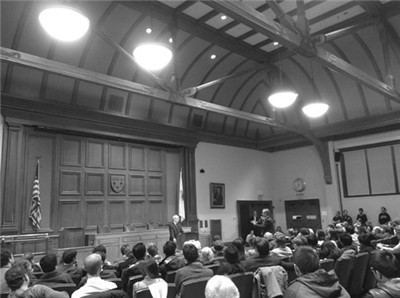Call me an idealist, but I’d like to think that the halls of higher education are less vulnerable to the siren calls of fame and fortune than other byways of American life are. I’d like to believe in a bold dividing line between academic virtues and celebrity values, between intellectual and commercial concerns.
大可以把我形容为理想主义者:我愿意认为,高等教育的殿堂与美国生活的其他路径相比,没那么容易受到名望和钱财的侵蚀。我愿意相信,学术界的品德与明星的价值之间,智识的思考与商业的考量之间,有一条醒目的界线。
But Henry Louis Gates Jr., a renowned Harvard professor, and Mehmet Oz, a surgeon on the faculty at Columbia, get in my way.
哈佛大学的著名教授小亨利·路易斯·盖茨(Henry Louis Gates Jr.),以及在哥伦比亚大学担任教职的外科医生梅梅特·奥兹(Mehmet Oz),推翻了我的想法。

I link the two because they’re both in the news, not because they’re equally in thrall to the television camera or identically unabashed peddlers of something other than fact. Oz is by far the more compromised figure.
我把这两个人联系起来是因为他们都受到了新闻报道的关注,而不是因为他们同样受到了摄像机的束缚、两人都同样不加掩饰地兜售不符合事实的东西。奥兹名誉受损的程度,远超盖茨。
But Gates, too, exemplifies what happens when a lecturer is bathed in bright lights and gets to hang with Ben Affleck, who will soon be on-screen in Batman’s billowing cape.
不过,盖茨的经历也显示出,大学教师沐浴在闪亮的灯光之中,并与本·阿弗莱克(Ben Affleck)为伍,会发生什么。本·阿弗莱克很快就会在银幕上披上飒飒飘扬的斗篷,扮演蝙蝠侠了。
Affleck was a guest last October on the PBS documentary series “Finding Your Roots,” in which Gates takes luminaries — Sting, Stephen King, Angela Bassett — on journeys into their pasts. Affleck signed up for the trip.
去年10月,阿弗莱克在PBS系列纪录片《寻根》(Finding Your Roots)中担任特邀嘉宾。盖茨在这部纪录片中与名人一道探寻自己的过去,如斯汀(Sting)、史蒂芬·金(Stephen King)、安吉拉·贝塞特(Angela Bassett)。阿弗莱克也自愿加入其中。
But when he learned that he had a slave-owning ancestor, he asked that the detail be excised, according to communications between Gates and his friend Michael Lynton, the chief executive of Sony Entertainment. Their exchange was part of the hacked Sony emails recently shared by WikiLeaks.
然而盖茨与他的朋友,索尼娱乐(Sony Entertainment)首席执行官迈克尔·林顿(Michael Lynton)的通信记录显示,当阿弗莱克得知自己有一个蓄奴的先辈后,却要求把这个细节剪掉。这些通信记录来自索尼遭到黑客攻击后外泄的电子邮件,这些邮件最近被发布在了维基解密(WikiLeaks)上。
“We’ve never had anyone ever try to censor or edit what we found,” Gates wrote to Lynton, going on to fret over the “integrity” of the series. “He’s a megastar. What do we do?”
“从来没有人尝试要删减或编辑我们得出的发现,”盖茨写邮件告诉林顿。接下来,盖茨也对系列片的“诚信”表现出了苦恼。“他是个巨星,我们应该怎么办?”
Gates left the detail out.
那部分内容,盖茨最终在片中略去未提。
After the disclosure of this late last week, he insisted, unpersuasively, that the cut reflected nothing more than the need to make room for other ancestors of Affleck’s who warranted inclusion in the episode.
上周晚些时候,这一情况公之于众后,他坚称,剪掉这个情节只是表明,当时需要腾出时间,在那一集中容纳阿弗莱克其他值得收录的先辈。只是这种说法无法令人信服。
Regardless, it exposed Gates, a trusted authority on the African-American experience, to accusations that he’d sold out. It diminished him.
无论如何,作为非裔美国人经历方面值得信赖的权威,盖茨都因为这番删减受到了背叛的指责。这损害了他的名誉。(亨利·盖茨是哈佛大学哈钦斯非洲及非裔美国人研究中心主任。——译注)
But wasn’t that inevitable from the moment he hitched scholarship to show business?
但从他把学术事业与娱乐业联系起来的那一刻,这种下场不就已经无可避免了吗?
“We conflate what a PBS special is with academic work,” Carol Anderson, who teaches at Emory University, told Jamil Smith in The New Republic. “We have to understand that so much of what we see there is packaged for a nonacademic audience that wants the picture of really deep, intellectual discussion, but is not quite ready for what that means.”
“我们把PBS的专题片与学术作品混为一谈,”在埃默里大学(Emory University)担任教职的卡罗尔·安德森(Carol Anderson)对《新共和》杂志(The New Republic)的贾米尔·史密斯(Jamil Smith)说。“我们必须明白,我们见到的很多信息是包装好,呈献给学术圈以外的观众的。那些观众希望看到相当高深、需要智力投入的讨论的画面,但对于这些讨论意味着什么,那部分观众却没有做好准备。”
What does the audience of “The Dr. Oz Show” want?
《奥兹博士秀》(The Dr. Oz Show)的受众想要什么?
To judge by what Oz gives them, it’s winnowed thighs, amulets against cancer and breathless promises of “magic” and “revolutionary” breakthroughs.
如果按奥兹兜售给他们的东西来判断,那么应该是纤瘦的大腿、针对癌症的护身符,以及“神奇”的、“革命性”突破等等激动人心的承诺。
Oz has morphed not just willingly but exuberantly into a carnival barker. He’s a one-man morality play about the temptations of mammon and the seduction of applause, a Faustian parable with a stethoscope.
奥兹仿佛是参加狂欢节一样大呼小叫,他愿意这样做,甚至乐此不疲。他仿佛在上演一出一个人的道德剧,展示了钱财的诱惑力和掌声的魔力,这是个戴着听诊器的浮士德式寓言人物。
Many Americans probably had no idea that he remained affiliated with Columbia — he’s vice chairman of its surgery department — until they read last week about an email sent to the university by 10 physicians around the country. They accused him of “promoting quack treatments” for “personal financial gain” and urged Columbia to sever its ties with him.
在上周读到全美有10名外科医生向哥伦比亚大学发送电子邮件之前,许多美国人可能并不知道奥兹与哥伦比亚大学还有关系——他是该校外科学系的副主任。这些医生指责奥兹为了“个人的收入”而“推广骗人的疗法”,敦促哥伦比亚大学与他断绝关系。
He’s expected to defend himself on television later this week, and his publicity machine has gone into overdrive, seeking to discredit the physicians and frame the issue as one of free speech.
预计本周晚些时候他会在电视上为自己辩护,他的公关机器已经开始超速疾驰,试图破坏那些医生的信誉,然后把问题描绘成言论自由。
But don’t forget that he was called before a United States Senate panel last year to explain his on-air gushing about green coffee extract, raspberry ketones and other faddish weight-loss supplements. Admonishing him, Senator Claire McCaskill noted that “the scientific community is almost monolithic” in its rejection of “products you called ‘miracles.’ ”
但不要忘记,他去年曾被美国参议院的一个委员会传唤,要求他对自己在电视上大肆吹捧绿咖啡豆萃取物、树莓酮,以及其他流行减肥补剂的言论作出解释。参议员克莱尔·麦卡斯基尔(Claire McCaskill)告诫他,“您称作‘奇迹’的产品,受到了科学界几乎普遍的”驳斥。
Also remember that the British Medical Journal published a study of scores of his show’s medical recommendations, saying more than half didn’t have sound scientific backing.
此外,请不要忘记《英国医学期刊》(British Medical Journal)发表了一篇文章,文中研究了他在节目中做出的数十项医学建议,结论是超过一半缺乏充分的科学依据。
And bear in mind that the Sony emails included one that showed Oz to be eager, as Vox reported, “to use his platform on the show to help expand Sony’s fitness and health-tracking devices market.” Sony is one of the producers of “Dr. Oz.”
也不要忘记,据Vox报道,索尼外泄的电子邮件中,有一则显示奥兹热切地想“利用他的节目作为平台,帮助拓展索尼的健身和健康追踪仪器市场。”索尼是《奥兹博士秀》的制片方之一。
But well beyond Oz, there’s an unsettling corruption of academia by celebrity culture.
但是学术界受到明星文化腐蚀的令人不安的现象,远比奥兹的问题更严重。
Many professors do double duty as television pundits, even though sound bites, which are inherently unsubtle, run counter to what scholarship exalts. And educational institutions choose speakers largely — and sometimes solely — for their star power. The University of Houston spent $155,000 to schedule Matthew McConaughey for its commencement next month.
许多教授兼职在电视上充当专家,尽管电视上摘出的关键词句会不可避免地有所夸大,与学术界赞赏的品格大相径庭。而教育机构选择演讲者时,关注的基本上是名气——有时甚至只关注名气。休斯顿大学(University of Houston)花了15.5万美元,安排马修·麦康纳(Matthew McConaughey)下个月在毕业典礼上发言。
Maybe he’s more learned than we realize. Or maybe erudition counts for less than buzz, even in those enclaves that are supposed to be about deep, durable things.
可能是因为麦康纳比我们所了解的更有才学。也可能是因为学识不如名气管用,即使是在大学这种理应更在乎深刻、持久的东西的地方。













